
The saxophone is a type of single-reed woodwind instrument with a conical body, usually made of brass. As with all single-reed instruments, sound is produced when a reed on a mouthpiece vibrates to produce a sound wave inside the instrument's body. The pitch is controlled by opening and closing holes in the body to change the effective length of the tube. The holes are closed by leather pads attached to keys operated by the player. Saxophones are made in various sizes and are almost always treated as transposing instruments. A person who plays the saxophone is called a saxophonist or saxist.

Le Sony'r Ra, better known as Sun Ra, was an American jazz composer, bandleader, piano and synthesizer player, and poet known for his experimental music, "cosmic" philosophy, prolific output, and theatrical performances. For much of his career, Ra led The Arkestra, an ensemble with an ever-changing name and flexible line-up.

Marshall Belford Allen is an American free jazz and avant-garde jazz alto saxophone player. He also performs on flute, oboe, piccolo, and the electronic EWI.

John Arnold Griffin III was an American jazz tenor saxophonist. Nicknamed "the Little Giant" for his short stature and forceful playing, Griffin's career began in the mid-1940s and continued until the month of his death. A pioneering figure in hard bop, Griffin recorded prolifically as a bandleader in addition to stints with pianist Thelonious Monk, drummer Art Blakey, in partnership with fellow tenor Eddie "Lockjaw" Davis and as a member of the Kenny Clarke/Francy Boland Big Band after he moved to Europe in the 1960s. In 1995, Griffin was awarded an Honorary Doctorate of Music from Berklee College of Music.

John Gilmore was an American jazz saxophonist, clarinetist, and percussionist. He was known for his tenure with the avant-garde keyboardist/bandleader Sun Ra from the 1950s to the 1990s, and led The Sun Ra Arkestra from Sun Ra's death in 1993 until his own death in 1995.
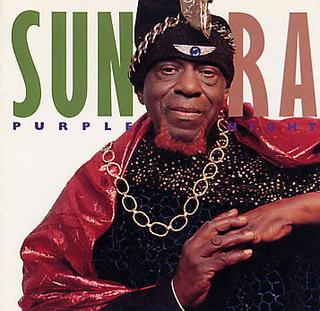
Purple Night is a studio album by free jazz pioneer Sun Ra. It was released in 1990 on A&M Records.

Featuring Pharoah Sanders and Black Harold is a jazz album by Sun Ra, recorded live on December 31, 1964, but not released until 1976, on Ra and Alton Abraham's El Saturn label. An expanded version of the album was reissued in 2009 by ESP-Disk, and again in 2017 by Superior Viaduct. A complete version of Sun Ra's performances on December 30 and 31, 1964 were released in 2012 on the Pharoah Sanders album In The Beginning 1963-1964.

Sound Sun Pleasure!! is an album by the American Jazz musician Sun Ra and his Astro Infinity Arkestra. Recorded March 6, 1959, it remained unreleased until 1970 when it was issued on the Saturn label. Recorded at the same time and with the same personnel as Jazz in Silhouette, the album is unusual amongst early Ra albums for predominantly featuring jazz standards.

Sun Ra and his Solar Arkestra Visits Planet Earth is a jazz album by the American musician Sun Ra and his Solar Arkestra. Recorded between late 1956 and 1958, the album was originally released on Ra's own Saturn label in 1966, and was reissued on CD by Evidence in 1992. In keeping with many Saturn releases, one side features cuts from the arkestra c.1958, whilst the other side comes from the 1956 sessions originally intended for Sound of Joy but still unreleased in 1966.

Fate in a Pleasant Mood is an album by the American jazz musician Sun Ra and his Myth Science Arkestra recorded in Chicago, mid 1960 and originally released on his own Saturn label in 1965. The album was reissued by Impulse! in 1974, and by Evidence in 1993. For the latter reissue, the record was included as the first half of a CD that also featured the whole of When Sun Comes Out, an album recorded by the Arkestra in New York, 1963.

For the song by Harold Arden and Ted Koehler, see When the Sun Comes Out
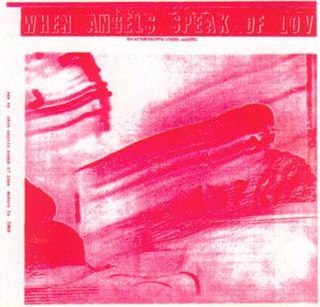
When Angels Speak of Love is a music album by the American Jazz musician Sun Ra and his Myth Science Arkestra. Originally released in 1966 on Sun Ra's own Saturn label, the record would have only been available by mail order or sold at Arkestra concerts, and is one of the rarest of all Saturn releases. The record was reissued on compact disc by Evidence in 2000.

Other Planes of There is an album by the American Jazz musician Sun Ra and his Solar Arkestra. Recorded in 1964, the album had been released by 1966 on Sun Ra's own Saturn label. The record was reissued on compact disc by Evidence in 1992.
'Granted, the selection is certainly not as abrasive and demanding as later efforts, although there is strident involvement from everyone within the dense arrangement. The brass and reed sections provide emphasis behind an off-kilter and loping waltz backdrop. All the more impressive is how well the material has held up over the decades. Even to seasoned ears, the music is pungent and uninhibited, making Other Planes of There a highly recommended collection.' Lindsay Planer
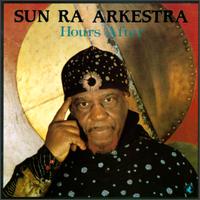
Hours After is an album by American composer, bandleader and keyboardist Sun Ra recorded in 1986 in Italy and released on the Black Saint label in 1989. The album was recorded at the same sessions the produced Reflections in Blue which was released in 1987.
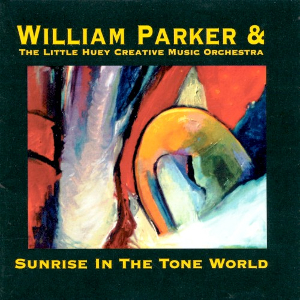
Sunrise in the Tone World is an album by American jazz double bassist William Parker, which was recorded live in 1995 and released on the AUM Fidelity label.
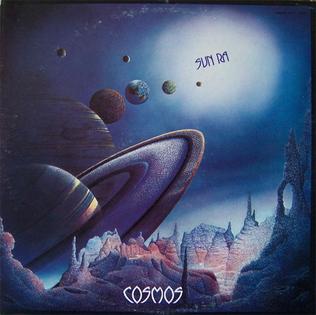
Cosmos is an album by jazz composer, bandleader and keyboardist Sun Ra and his Arkestra recorded in France in 1976 and originally released on the French Cobra label in Europe and on Inner City Records in the US.

Strange Celestial Road is an album by jazz composer, bandleader and keyboardist Sun Ra and his Arkestra, recorded in New York in 1979 and originally released on the Rounder label.

It's After the End of the World is a live album by American composer, bandleader and keyboardist Sun Ra recorded in 1970 in Donaueschingen and Berlin and released on the MPS label in 1970. The complete concerts were released in 1998 as a 2-CD set entitled Black Myth/Out in Space.
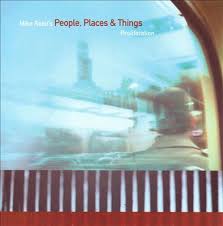
Proliferation is the debut album by People, Places & Things, a quartet led by American jazz drummer Mike Reed featuring saxophonists Greg Ward and Tim Haldeman, and bassist Jason Roebke. It was recorded in 2007 and released on 482 Music. Reed formed the band to explore the Chicago hard-bop scene from 1954-1960.

In the Beginning 1963–1964 is a 4-CD compilation album by American free jazz saxophonist Pharoah Sanders recorded in 1963-1964 and released in 2012 on the ESP-Disk label. It features previously unreleased recordings of Sanders performing with groups led by Don Cherry and Paul Bley, complete concert recordings of Sanders' appearances with Sun Ra, a re-release of Sanders' first album, and various interviews.




















